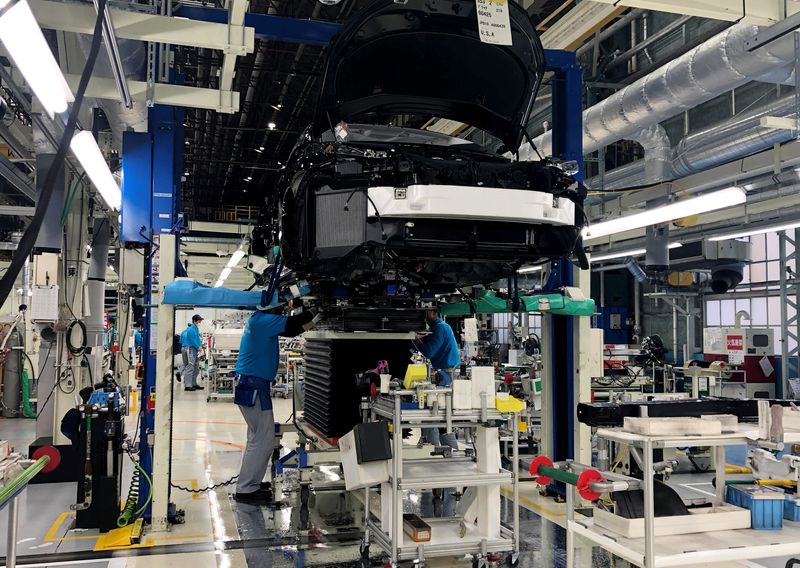By Daniel Leussink and David Dolan
TOKYO (Reuters) -Japanese companies are increasingly hitching their growth plans to the United States, as concerns about Chinese demand and Beijing's influence over supply chains prompt a noticeable pivot toward the world's largest economy.
Robot maker Yaskawa Electric, drinks company Asahi, chipmaker Renesas Electronics and automaker Honda (NYSE:HMC) are just a few of the companies that in recent months have either expressed interest in expanding in the U.S. or announced plans to do so.
While Japan remains tied to China through extensive trade and manufacturing operations, Tokyo has pledged with other members of the Group of Seven (G7) nations to "derisk" but not "decouple" from the world's second-largest economy.
That trend of limiting supply-chain exposure to China was highlighted by Prime Minister Fumio Kishida's trip last week to the United States. Kishida, who visited North Carolina to tour a Toyota Motor (NYSE:TM) EV battery facility now under construction, also emphasised cooperation on supply chains.
After years of seeing China as a market of almost endless opportunities, Japanese companies are now taking a more cautious view, executives and analysts say. Almost half of Japanese companies operating in China did not invest there last year or reduced investment, a survey showed in January.
Some of the caution is due to economic security risks - China last year detained a senior Astellas Pharma executive on suspicion of spying - while many companies cite pessimism about Chinese demand and a weakening economy.
"The illusion about the Chinese economy, the Chinese market, is disappearing," said Kunihiko Miyake, research director at the Canon Institute for Global Studies think tank.
"I think Japan and the United States started to discover the merits of each other."
Miyake said he has been advising companies to bring home state-of-the-art technology from China.
The share of Japanese firms planning to expand in China fell below 30% for the first time, an annual survey from the Japan External Trade Organisation showed in November. Only Hong Kong and Russia scored worse.
Meanwhile, the share looking to expand in North America rose above 50%. Still, it remains to be seen how the tension around Nippon Steel's bid for U.S. Steel will impact the outlook.
AUTO INDUSTRY
For Japanese automakers, the importance of the U.S. market has been amplified by their decline in China, where they have steadily ceded ground to electric vehicle giant BYD (SZ:002594) and other local players.
"China has turned into very rough going for the Japanese automakers as sales have declined there a lot, particularly as consumers have been tilting towards... electric vehicles made by local brands," said Christopher Richter, senior Japan autos analyst at brokerage CLSA.
"That heightens the importance of the U.S. market," he said, adding that historically, the United States has been the most profitable market for Japan's car companies, exceeding even their home country.
Toyota late last year said it would boost investment by $8 billion at its EV battery plant in North Carolina, bringing the total investment to around $13.9 billion. The plant, which is expected to begin operations in 2025 will be its first automotive battery plant globally.
Honda this month said it would invest at least $700 million in transforming its Ohio plants as it creates an EV hub in the state.
The Honda investment showed how Japanese car companies weren't just investing for next year but for "years down the line" said Anita Rajan, general director of JAMA USA, a lobby group that represents the Japanese automakers.
Privately, one senior executive at a Japanese automaker said he was amazed by the dynamism of the U.S. economy. That, together with the difficulties in China, made him think the U.S. market offered the better opportunity for growth, he said.
'NIPPON STEEL'
Last year Japanese overseas acquisitions totalled 8.1 trillion yen ($53 billion), the most since 2019 and roughly double from a year earlier, according to LSEG data. More than half of that was in the United States.
But the United States is not without its complications.
Nippon Steel's $15 billion bid for U.S. Steel has riled politicians, with President Joe Biden saying the manufacturer must remain domestically owned and operated, while Donald Trump has pledged to block the deal if he becomes president again.
And despite the many headwinds in China, Japan Inc remains heavily reliant on its neighbour, both as a manufacturing base and a market.
Last year, mainland China was Japan's largest source of imports, at $174 billion, and its second-largest export market, at $126 billion, according to IMF trade statistics.
The United States was its top export market.
While some companies may see the U.S. market as a better long-term option, others don't have that option, said Canon Institute's Miyake.
"It's what I call the Hotel California syndrome," he said. "You can check out any time. You can never leave."
($1 = 154.2800 yen)
